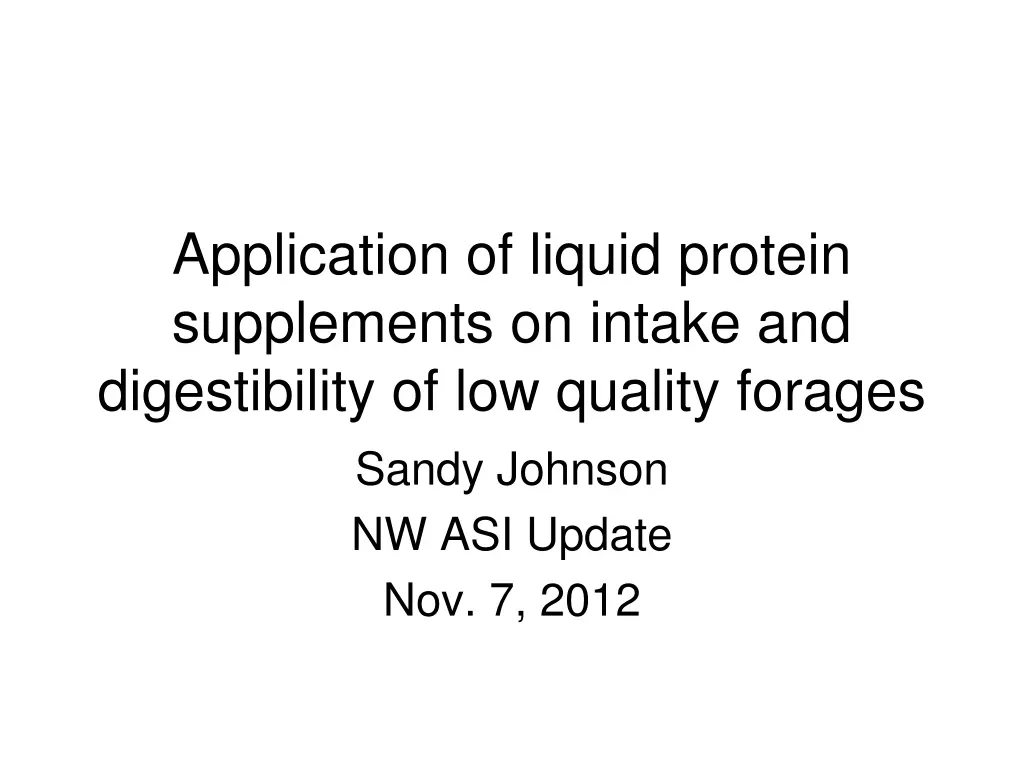
Application of Liquid Protein Supplements on Forage Intake and Digestibility
Explore the impact of liquid protein supplements on the intake and digestibility of low-quality forages through various studies and trials, highlighting changes in nutritive content and gas production estimates. Discover how treatments such as ammoniation and liquid supplementation affect animal performance and forage quality.
Download Presentation

Please find below an Image/Link to download the presentation.
The content on the website is provided AS IS for your information and personal use only. It may not be sold, licensed, or shared on other websites without obtaining consent from the author. If you encounter any issues during the download, it is possible that the publisher has removed the file from their server.
You are allowed to download the files provided on this website for personal or commercial use, subject to the condition that they are used lawfully. All files are the property of their respective owners.
The content on the website is provided AS IS for your information and personal use only. It may not be sold, licensed, or shared on other websites without obtaining consent from the author.
E N D
Presentation Transcript
Application of liquid protein supplements on intake and digestibility of low quality forages Sandy Johnson NW ASI Update Nov. 7, 2012
Nutritive changes in ammoniated or liquid protein treated wheat straw Dry Matter Treatment Ammoniation CP NDF ADF Pretreatment 94.7 2.8 77.6 46.7 Post-treatment 89.8 9.9 70.8 41.6 Liquid Supplement Pre-treatment 95.4 2.9 77.8 46 Post-treatment 95.2 3.5 75.7 42.2 Goehring et al., 1990
Gas TDN Estimate Production, ml/hr Treatment Ammoniation IVDMD ADF IVDMD Pretreatment 30.9d 9.2d 42.6 39.6d 34% Post-treatment 41.4f 12.7e 48.5 47.4g Liquid Supplement Pre-treatment 33.3e 9.1d 43.5 41.3e 6% Post-treatment 35.2g 10.0d 47.8 42.8f d,e,f,g Means with different superscripts differ. P<0.05 Goehring et al., 1990
Liquid Suppl Control NaOH Ammoniated Cow Trial ADG, lb Straw intake, lb Sheep metabolism trial DM digestibility,% 53.6a Intake, lb .26b 19.3a 0a .10a 17.8a .88c 23.0b 17.3a 53.5a 1.30b 52.4a 1.32b 59.7a 1.43c .99a IVDMD,% 50.3a 54.2b 49.7a 57.7c a,b,c, Unlike superscripts in a row differ (P<0.05) using orthogonal contrasts Faulkner et al., 1981 (yr?)
Cow Preference for NaOH or Liquid Supplement treated straw compared to untreated straw Trial 1 Trial 2 Treatment Estimated intake, lb Untrt 2.3 NaOH Untrt 13.3 LS 12.1 2.5 IVDMD 37.6 46.7 37.6 41.1 NDF, % 87.7 82.0 87.7 86 Crude Protein, % 3.3 4.5 3.3 8.6 Paterson et al., 1980
Hay quality following injection with molasses-urea solution - LSU Study 1 Bermudagrass hay Control Injected 12.3 39.5 70.7 53.0 69.8 Study 2 Johnsongrass- crabgrass hay Control 7.8 47.3 74.7 44.1 64.3 Item (%DM) CP ADF NDF TDN IVDMD Injected 7.5 47.0 73.9 44.4 64.2 13.2 38.6 70.3 54.0 71.6 McCormick et al., 2010
Hay palatability following injection with molasses-urea solution - LSU Study 1 Hay Bermudagrass Control Study 2 Hay Johnsongrass-crabgrass Control Item (%DM) Injected Injected Bales tested 8 8 6 6 Bale weight 1227 1282 1229 1272 Hay refusals, lb 641a 343a 700a 555b Intake/period 586a 939b 529a 717b Intake/calf/d 5.22a 8.28b 5.01a 6.38b Hay intake, %BW 0.75 1.18 0.71 0.91 a,b, Study 1 means differ P<0.01; Study 2 means tend to differ P<0.10 McCormick et al., 2010
Summary Ammoniation Increase digestibility Increase intake Increase CP treat group of bales LS injection Increase intake Nutrient content function of dilution treat individual bales
Gas TDN Estimate Production, ml/hr Treatment Ammoniation IVDMD ADF IVDMD Pretreatment 30.9d 9.2d 42.6 39.6d 20% Post-treatment 41.4f 12.7e 48.5 47.4g Liquid Supplement Pre-treatment 33.3e 9.1d 43.5 41.3e Post-treatment 35.2g 10.0d 47.8 42.8f d,e,f,g Means with different superscripts differ. P<0.05 Goehring et al., 1990
Nitrates KPICS
Nitrate Concentration in Forages Survey Date Location of forage sampled (City) County/District of forage sampled
Nitrate tests KPICS Sub-samples you were asked to collect correct sub sample procedure 2 teaspoons to cup type of forage actual nitrate value and associated units (copy analysis sheet)
Starting weight and condition EW NW n 18 18 Cow age, yr 4.3 .6 4.6 .6 Julian calving date 57 3 60 3 Calf weight, lbs. 351 13 367 13 Cow weight, lbs. 1023 39 1072 38 Cow body condition 3.6 .2 3.9 .2
Ending weight and condition P EW NW 0.01 Cow weight, lbs 1182 10 1137 10 Cow weight change, lbs 137 10 93 10 0.08 Cow body condition 4.7 0.1 4.5 0.1 Cow body condition change Dry matter intake 0.9 0.1 0.7 0.1 20.4 3 25.5 3
Body condition change in 2-yr old and mature cows after a 77 day re-feeding period following nutrient restriction
Day 0 Day 77
Ideas for local demonstrations technology that isn t being used scales
Hay waste Feeder type Access time Shred vs unrolling At current cost of hay when does it pay to buy bunks/processing ect.
Methods of Feeding Hay Method Unrolled on the grounda Processed, fed on grounda 16% Processed, fed in bunka Hay Feeders Ground Hay Amount Wasted 22% 7-9 % <5%? 11% aBlasi et al., 1993 Cattlemen s Day
Access time to hay Free choice 207 3 hours 119 0.1 17.6 5.9 11.7 6 hours 161 0.5 24.4 5.7 15.0 9 hours 191 0.7 29.3 9.2 19.6 Weight change, lbs a 0.8 34.1 13.4 22.7 Body condition change a Hay disappearance, lbs DM/d a Hay waste, lbs DM/d b Manure production, lbs DM/d b a linear and quadratic effects (P<0.01) b linear effect (P<0.01)
